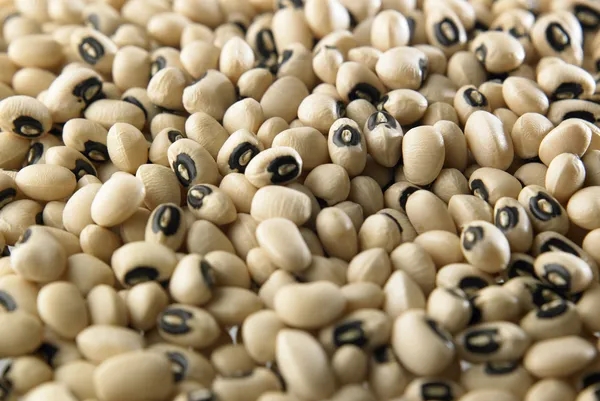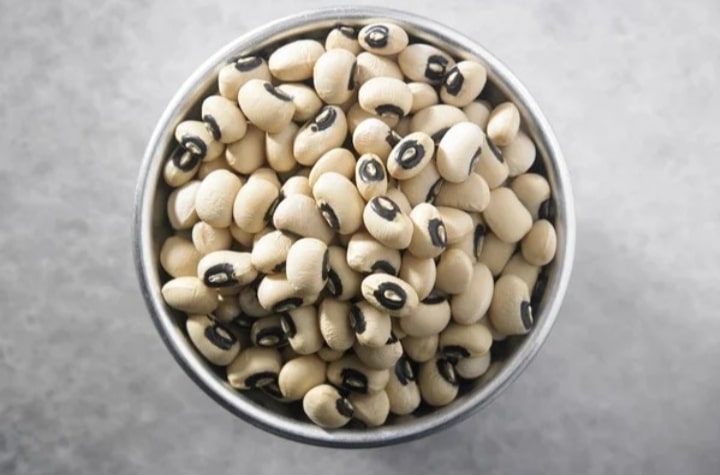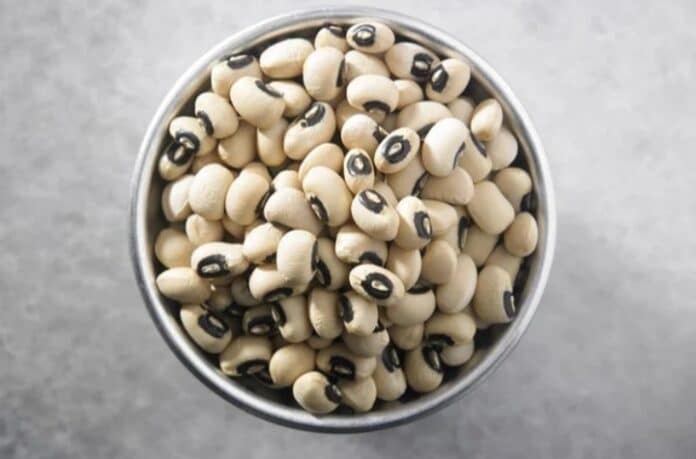Black-eyed bean (Vigna unguiculata) is a medium-sized, edible legume grown in many parts of the world. It is a specie of cowpea, a plant domesticated in Africa, and is sometimes called cowpea. They have a very pale color and a large black, brown, or red spot that resembles an eye, hence, the name.
You might be wondering what the difference between black-eyed beans and black-eyed peas is. The fact is that they both belong to the same family, and there isn’t any noticeable difference between them. They both are leguminous plants with several health benefits and can be used interchangeably with each other. However, in Nigeria, black-eyed peas are referred to as black-eyed beans. They are often used in preparing Ewa riro (stewed beans) and many other dishes.
The black eyed-beans offer many benefits ranging from their bodybuilding capacity, tissue repair, and many more. This plant is proteinous and contains sufficient fiber that helps in checking the weight. It also reduces the effect of diabetes, strengthens the bones, controls blood pressure, minimizes indigestion, amongst others. This article discusses the nutritional value and health benefits of black-eyed beans.
Nutritional Value of Black-eyed Beans

Black-eyed beans are loaded with nutrients and contain lots of carbohydrates, fiber, and protein. They have significant amounts of copper, magnesium, zinc, potassium, phosphorus, and iron.
They are also incredibly rich in vitamins such as folate (vitamin B9) and thiamine (vitamin B1).
Health Benefits of Black-eyed Beans

Because of their rich nutritional profile, black-eyed beans come with numerous health benefits, and below are some of them:
1. Improves digestive health
Black-eyed peas have a good amount of soluble fiber. Soluble fiber is a vital nutrient that aids in promoting the health of the digestive system. 170 grams of cooked black-eyed beans contains 11 grams of soluble fiber. Many studies have shown that consuming more soluble fiber can help improve your digestive health, increase stool frequency, and prevent constipation.
2. Supports weight loss
Black-eyed beans are rich in protein and soluble fiber, which make it a great food for weight loss. 100 grams of raw black-eyed beans contain approximately 24 grams of protein and 11 grams of fiber. Hence, eating black-eyed beans can help you feel fuller and reduce feelings of hunger.
3. Good for the brain
Another one of the fantastic health benefits of black-eyed beans is it improves brain health. They are especially packed with thiamine (vitamin B1), which is crucial to the functioning of the nervous system. Thiamine plays a role in many bodily processes. Our bodies use thiamine to convert nutrients into energy and keep our brain and nervous system functioning properly.
4. Strengthens the immune system
There are a number of vital nutrients and minerals present in black-eyed beans, which can help fortify your immune system. This healthy food has copper, zinc, iron, and magnesium in significant amounts. And these nutrients contribute to a healthy immune system. For example, copper is important in the production of white blood cells.
5. Maintains a healthy heart
Black-eyed beans contain phytosterols which are very useful in reducing your cholesterol levels. Phytosterols also help eliminate cancer and give you a heart with good working conditions. Other studies have demonstrated that regularly eating legumes, such as black-eyed beans, has also been linked to lowering inflammation, which can also help reduce your risk of heart disease.
6. Helps to prevent anaemia
Anaemia is a common ailment common in vegetarians and pregnant women, which results in fatigue. This results from insufficient iron in the blood transporting oxygen around the body. The iron contained in the black-eyed beans helps increase iron levels in the body, which helps combat anaemia. These beans are also an excellent source of copper, which works with iron to help the body form red blood cells.
7. Manages diabetes
As a diabetic patient, you know that the best way to manage that situation is to keep your sugar intake in check. Adding black-eyed beans to your diet can help regulate your blood sugar level. The fiber contained in black-eyed beans helps to normalize the blood sugar level in the body.
8. Strengthen the bones
Black-eyed beans have high amounts of calcium, copper, and phosphorus, which strengthens the bones and prevents osteoporosis. For example, as a woman, calcium is drained from the body during childbirth, resulting in osteoporosis. This is the medical condition of the bones becoming weak. The black-eyed beans are rich in phosphorus, and calcium, helps strengthen your bones and keeps you active while aging.
9. Excellent source of protein
Protein is an essential nutrient in the body that helps build and maintain the muscles. So if you work out and wish to cut down your meat intake, you need to include black-eyed beans in your diet. It’s a good source of protein that helps you build up those muscles and get energized.
10. Good for pregnant women
Black-eyed beans contain some vital vitamins and minerals essential for pregnant women. It is rich in folate, a vitamin that reduces the risk of child defects during birth in pregnant women. 170 grams of cooked black-eyed beans contains 88% of the Daily Value (DV) of folate. Thus, black-eyed beans should be consumed by pregnant women.
Bottom Line
Apart from the nutrition benefits of the black-eyed beans, it also has a fantastic taste. It can be cooked as a meal or ground and then added to dishes or mixed in hot or warm water and served as tea. This wonder legume is beneficial to both the young and old, especially pregnant women. It is a must-have food for every home.
ALSO READ:
- 9 Powerful Health Benefits Of Raw Garlic
- 7 Stunning Health Benefits Of Green Pepper
- 7 Magnificent Health Benefits of Oats
- 7 Perfect Health Benefits Of Parfait
- 10 Amazing Health Benefits Of Bay Leaves
- 9 Delightful Health Benefits of Sugarcane Juice
- 10 Grand Health Benefits of Tangerine Peel
- 8 Health Benefits of Scotch Bonnet Pepper (Ata Rodo)



